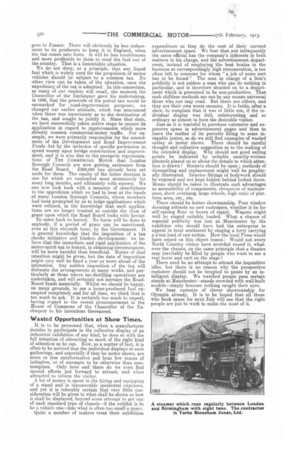Considerations in Relation to the Coming Tax on Benxol.
Page 1

Page 2

If you've noticed an error in this article please click here to report it so we can fix it.
It is with additional regret that we are in a position to confirm our announcement of a week ago, that the intention of the authorities is to enforce the tax upon benzol very soon. At a time when increases in the price of petroleum spirit are notified by the importing companies, with further peospects of a like kind ahead of us, one might. have been excused for hoping that the Government of this country would have waived the application of the 1910 Finance Act for a term, in order that a home-produced fuel might, if we may use a colloquialism, be given time "to get upon its legs." The fact that the tax will not be exacted in respect of any benzol that is exported, is one which will undoubtedly tend to extend the existing practice of manufacturers 10 sell to the Continent. At the present moment. a considerable proportion of the benzol which is finished in suitable form for consumption in internal-combustion engines
goes to France. There will obviously be less inducement to its producers to keep it in England, when the tax comes into force. It will be less troublesome and more profitable to them to send the fuel out of the country. That is a lamentable situation.
We do not deny, as a principle, that any liquid fuel which is widely used for the propulsion of motor vehicles should be subject to a common tax. No other view can be taken of the situation, once the expediency of the tax is admitted. In this connection, as many of our readers will recall, the moment the Chancellor of the Exchequer gave his undertaking, in 1909, that the proceeds of the petrol tax would be earmarked for road-improvement purposes, we changed our earlier attitude, which was announced when there was uncertainty as to the destination of the tax, and sought to justify it. Since that date, we have successfully taken active steps to ensure its application in regard to improvements which more directly concern commercial-motor traffic. For example, we were primarily responsible for the amendment of the Development and Road Improvement Funds Act by the inclusion of specific permission to spend money upon bridge construction and improvement, and it is also due to the energetic representations of THE COMMERCIAL MOTOR that London Borough Councils are now getting assistance from the Road Board. £250,000 has already been set aside for them. The equity of the latter decision is one for which we contended most etrenuou sly for many long months, and ultimately with success. We can now look back with a measure of cheerfulness to the opprobium which we had to bear at the hands of many London Borough Councils, whose members had been prompted by us to lodge applications which were refused, in the knowledge that such applications are no longer treated as outside the class of grant upon which the Road Board looks with favour.
To come back to benzol. No harm will be done to anybody, if a period of grace can be sanctioned, even at this eleventh hour, by the Government. It is general knowledge that the imposition of a tax checks initiative and hinders development : we believe that the immediate and rigid application of the motor-spirit tax to benzol, in obtaining circumstances, will be more harmful than beneficial. Notice of that intention might be given, but the date of imposition might very well be fixed a year or more ahead of the intimation. Any sudden imposition of the tax will dislocate the arrangements at many works, and particularly at those where tar-distilling operations are undertaken, and will certainly not increase the RoadBoard funds materially. Whilst we should be happy, on many grounds, to see a home-produced fuel exempted completely and for all time, we think that is too much to ask. It is certainly too much to expect, having regard to the recent pronouncement in the House of Commons of the Chancellor of the Exchequer to his intentions thereanent.


























































































